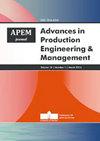Improved Genetic Algorithm (VNS-GA) using polar coordinate classification for workload balanced multiple Traveling Salesman Problem (mTSP)
IF 2.8
3区 工程技术
Q2 ENGINEERING, MANUFACTURING
引用次数: 5
Abstract
The multiple traveling salesman problem (mTSP) is an extension of the traveling salesman problem (TSP), which has wider applications in real life than the traveling salesman problem such as transportation and delivery, task allocation, etc. In this paper, an improved genetic algorithm (VNS-GA) that uses polar coordinate classification to generate the initial solutions is proposed. It integrates the variable neighbourhood algorithm to solve the multiple objective optimization of the mTSP with workload balance. Aiming to workload balance, the first design of this paper is about generating initial solutions based on the polar coordinate classification. Then a distance comparison insertion operator is designed as a neighbourhood action for allocating paths in a targeted manner. Finally, the neighbourhood descent process in the variable neighbourhood algorithm is fused into the genetic algorithm for the expansion of search space. The improved algorithm is tested on the TSPLIB standard data set and compared with other genetic algorithms. The results show that the improved genetic algorithm can increase computational efficiency and obtain a better solution for workload balance and this algorithm has wild applications in real life such as multiple robots task allocation, school bus routing problem and other optimization problems.基于极坐标分类的改进遗传算法(VNS-GA)求解负载平衡多重旅行商问题
多旅行商问题(mTSP)是旅行商问题(TSP)的扩展,在现实生活中有着比旅行商问题更广泛的应用,如运输配送、任务分配等。本文提出了一种利用极坐标分类生成初始解的改进遗传算法(VNS-GA)。结合变邻域算法解决了负载均衡的多目标优化问题。为了平衡工作负载,本文的第一个设计是基于极坐标分类生成初始解。然后设计了距离比较插入算子作为邻域动作,用于有针对性地分配路径。最后,将变邻域算法中的邻域下降过程融合到遗传算法中,扩大了搜索空间。在TSPLIB标准数据集上对改进算法进行了测试,并与其他遗传算法进行了比较。结果表明,改进后的遗传算法可以提高计算效率,得到较好的负载均衡解决方案,该算法在多机器人任务分配、校车路线问题等优化问题中具有广泛的应用前景。
本文章由计算机程序翻译,如有差异,请以英文原文为准。
求助全文
约1分钟内获得全文
求助全文
来源期刊

Advances in Production Engineering & Management
ENGINEERING, MANUFACTURINGMATERIALS SCIENC-MATERIALS SCIENCE, MULTIDISCIPLINARY
CiteScore
5.90
自引率
22.20%
发文量
19
期刊介绍:
Advances in Production Engineering & Management (APEM journal) is an interdisciplinary international academic journal published quarterly. The main goal of the APEM journal is to present original, high quality, theoretical and application-oriented research developments in all areas of production engineering and production management to a broad audience of academics and practitioners. In order to bridge the gap between theory and practice, applications based on advanced theory and case studies are particularly welcome. For theoretical papers, their originality and research contributions are the main factors in the evaluation process. General approaches, formalisms, algorithms or techniques should be illustrated with significant applications that demonstrate their applicability to real-world problems. Please note the APEM journal is not intended especially for studying problems in the finance, economics, business, and bank sectors even though the methodology in the paper is quality/project management oriented. Therefore, the papers should include a substantial level of engineering issues in the field of manufacturing engineering.
 求助内容:
求助内容: 应助结果提醒方式:
应助结果提醒方式:


